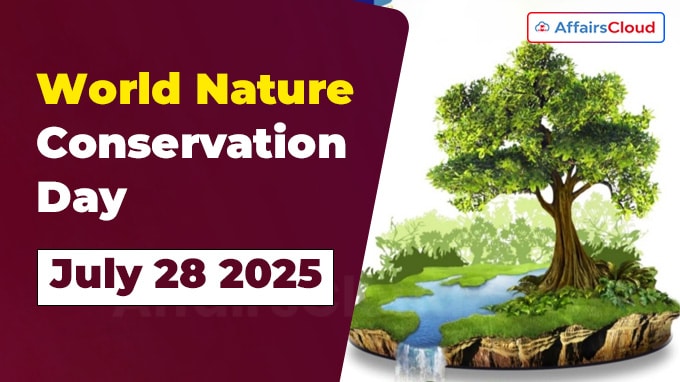 World Nature Conservation Day(WNCD) is celebrated every year on July 28 to emphasize the importance of protecting the Earth’s natural resources and preserving biodiversity for a sustainable future.
World Nature Conservation Day(WNCD) is celebrated every year on July 28 to emphasize the importance of protecting the Earth’s natural resources and preserving biodiversity for a sustainable future.
- This day serves to raise global awareness about the urgent need to protect and sustainably manage the Earth’s natural resources: air, water, soil, plants, and animals, to maintain a healthy planet for current and future generations.
History:
Origin: In June 1972, during the United Nations(UN) Conference on the Human Environment in Stockholm, Sweden, the UN General Assembly(UNGA) officially designated July 28 as WNCD, marking a pivotal moment in global environmental awareness and conservation efforts.
Global Commitment: This observance aligns with broader environmental initiatives born at that landmark conference, which also led to the creation of the United Nations Environment Programme(UNEP).
Reflecting on Global Environmental Progress:
Reviewing Global Progress: This day provides an important platform to assess the advancements made under key international environmental agreements, including the United Nations Framework Convention on Climate Change (UNFCCC), the Convention on Biological Diversity (CBD), and the Sustainable Development Goals (SDGs).
Focus on SDGs: It particularly highlights three critical goals:
- Goal 13: Climate Action
- Goal 14: Life Below Water
- Goal 15: Life on Land
Nature Conservation Methods:
Reduce: Minimize overall consumption by cutting down on single-use plastics and avoiding unnecessary purchases.
Reuse: Instead of discarding old items like clothes, find creative ways to repurpose or reuse them.
Recycle: Properly sort recyclable materials to decrease landfill waste and conserve natural resources.
Water Conservation: Simple actions like taking shorter showers, fixing leaks, and using water-efficient appliances can greatly reduce water usage.
Energy Conservation: Use energy-efficient devices, switch off unused lights, and prefer renewable energy sources to lower energy consumption and carbon emissions.
Sustainable Agriculture: Techniques such as crop rotation, cover cropping, and reduced tillage enhance soil health and reduce dependence on chemical fertilizers.
India’s Initiatives for Nature Conservation:
National Mission for Green India (GIM): The GIM is one of India’s flagship programmes under the National Action Plan on Climate Change (NAPCC).
- Launched by the Government of India(GoI) in 2014, it focuses on protecting, restoring, and enhancing forest ecosystems, particularly dense and degraded forests rich in biodiversity.
- The initiative plays a vital role in increasing forest-based livelihoods and improving ecosystem services across various Indian states.
Namami Gange Mission: It was launched in 2014 by the GoI. It is a comprehensive programme aimed at cleaning and conserving the Ganga River, which flows through Kanpur and Varanasi in Uttar Pradesh(UP), and several other states.
- This flagship initiative tackles river pollution, ensures sustainable use of water resources, and works to protect and restore wetlands and biodiversity hotspots along the river basin
Lifestyle for Environment (LiFE): The LiFE initiative was introduced by Prime Minister(PM) Narendra Modi on November 1, 2021, at the 26th UN Climate Change Conference (26th Conference of the Parties, COP26) in Glasgow, Scotland, United Kingdom (UK).
- LiFE promotes an eco-conscious lifestyle, encouraging individuals to adopt sustainable practices such as avoiding single-use plastics, saving water, reducing energy consumption, and recycling household waste. It aims to build a global mass movement of “pro-planet people” to protect natural ecosystems.




